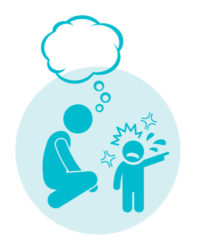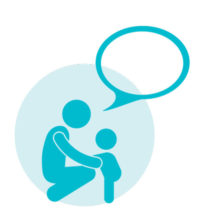The parental journey is a deeply emotional experience with wide-ranging emotions. Positive emotions and appropriate behaviours are celebrated but inappropriate ones are usually and automatically met with harsh reactions by parents who react, instead of responding constructively.
Reactions are instant and without much thought. When parents react, it may lead to escalating situations, especially when the child reacts badly, thus leading to a vicious cycle that spins out of control. Responses involve thinking through, and arriving at rational solutions that often defuses conflicts.
However, to respond is easier said than done as most of us were not brought up this way. It is a skill developed by focusing on compassion, empathy and the present needs of the child. As such, responding must be practised for it to occur automatically. You will face many challenges in trying to respond, and you will make mistakes. It is important to realise this as the key to responding appropriately begins with self-awareness and compassion towards yourself.
Adapt & respond
Harsh reactions that are emotionally charged or prolonged (e.g. nagging) create unnecessary stress for your child and you. Often, it leaves the actual problem unresolved, and repeating the cycle. This results in more frustration and helplessness in both parties.
If you feel trapped in this vicious cycle, change your approach. Start by being a role model and manage your own reactions. This helps to bring actual long-term solutions to current problems and encourages better adaptive skills in your children as well, strengthening their sense of resilience and emotional management.
Avoid reacting with strong negative expressions towards your child’s inappropriate behaviours – instead, adaptively respond to his behaviour in ways that help him understand why his behaviour is unacceptable. This defuses potential showdowns and also shows him of how to handle his emotions.
For instance, reacting to a 2-year-old’s tantrum by shouting at him will distress him further. Think about your objectives first – if it is to reduce his tantrum, then understanding why he is distressed allows you to use an approach that reduces his distress. This can be accomplished not by giving in to him, but by helping him to understand how to manage himself appropriately.
Misbehaviours are a form of communication and tantrums indicate distress due to rejection or frustration. Understanding the cause allows you to acknowledge it and to suggest a more appropriate way of expressing frustration to your child.
It’s up to you to set the tone when handling situations, so do not react based on your own emotions – instead, take the time to respond calmly. Focus on the goal and not the current situation. Consider whether your responses help facilitate or hinder the goal – if it is the latter, change your methods.
To positively deal with your child:
- Respond to the situation not his reaction. Stay calm and speak to him in a firm but gentle manner, even if he shouts or screams. If he is too distraught, resume your conversation later.
- Acknowledge your feelings. If you are also feeling distressed and have difficulties being calm, it can be helpful to acknowledge how you feel to your child and show that you would like to work with him. This way you are modelling how he can also express himself when in distress and ask for help.
- Take a breather. Suppress any knee-jerk reactions when faced with behaviours that rub you the wrong way. You can take a few deep breaths or a quick time away.
- You’re the role-model. Handle situations by keeping your cool. Refrain from scolding or shouting threats at him. Speak calmly and provide support where needed.
Keep calm and carry on
The tough part is to learn to manage your own emotions and control your reactions. On your bad days, address this first to avoid unintentionally taking out your frustrations on your child. Find a method that works for you (e.g., speaking to someone, going for a walk, or gardening, etc).
Intense reactions based on frustration will escalate the situation. Remember that you are dealing with an immature child who still can’t handle his emotions. Aim for responses that are calming, and avoid getting overly emotional as it may scare him.
Using empathy and compassion will more likely calm him down. It also shows an example of how he can cope with these situations and that you care about his distress, providing a better sense of safety and feeling cared for.
Dealing with misbehaving children will tax your patience but hang in there. To retain your sanity:
- Tailor your expectations. His behaviour varies depending on his developmental stage and temperament. Understanding this helps you be better prepared for his behaviour.
- Give him time to calm down. Sometimes he just needs a little time to calm down. It never hurts to give him a hug, ask him to wash his face if he has been crying, or take him away from where he had his breakdown for a quick walk, or to a safer place.
- Self-compassion. Go easy on yourself. It is easy for parents to be hard on themselves for not being able to contain their children’s behaviour and emotions. Calm down and be kind to yourself. Take regular breaks to relax and rejuvenate where possible.
- Address stress with serenity. Changes in your behaviour will be noticed. Be prepared to handle worse behaviour from your child before seeing any improvements as children tend to test their boundaries with a calmer parent. You need to persist with calmness and let them learn to accept you this way.
An educational collaboration with Malaysian Society of Clinical Psychology.









Comments